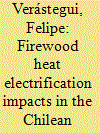| Srl | Item |
| 1 |
ID:
177507


|
|
|
|
|
| Summary/Abstract |
Energy Systems Integration (ESI) is an emerging paradigm and at the centre of the EU energy debate. ESI takes a holistic view of the electricity, gas, and heat sectors to deliver a clean, reliable, and affordable energy system. By using the synergies within and between sectors, ESI aims to increase flexibility in the energy system, maximise the integration of renewable energy and distributed generation, and reduce environmental impact. While ESI-enabling technologies have been studied from a technical perspective, the economic, regulatory, and policy dimensions of ESI are yet to be analysed in depth. This paper discusses ESI in a multi-step approach. We first focus on the economics of ESI-enabling technologies. Then we briefly discuss how the EU national regulators incentivise their adoption. Major economic and policy barriers to ESI are identified and policy solutions to overcome these barriers are proposed. We conclude that current regulatory frameworks in the EU do not sufficiently stimulate ESI investments and only through proper design of incentives ESI can be adopted.
|
|
|
|
|
|
|
|
|
|
|
|
|
|
|
|
| 2 |
ID:
176843


|
|
|
|
|
| Summary/Abstract |
Chile presents an extended use of low-quality firewood for residential heating. This raises serious concerns, mainly related to health problems due to particulate emissions from firewood combustion. Several initiatives have been considered by the Chilean government to address this, including heat electrification goals. In addition, the Chilean power system is undergoing a decarbonization process. This paper analyzes the impacts of firewood heat electrification over the Chilean power system’s decarbonization process until 2044, based on a capacity expansion planning model and an estimation of firewood heat demand, to account for major changes in load shape and spatial distribution. The results show that there is a large increase in the power system total cost (ranging from 5.6% to 19.4%), with flexibility requirements becoming larger in the south. Technologies that strongly depend on local resource availability, such as wind and concentrated solar power, present changes in their systemic value, altering the need for storage and flexibility. Also, aspects such as household insulation, electrification efficiency, and smart heating technologies would significantly impact the process in terms of cost reduction and optimal generation mix. The policy implications for the Chilean power system are presented, within the broader discussion of the overall firewood problem.
|
|
|
|
|
|
|
|
|
|
|
|
|
|
|
|